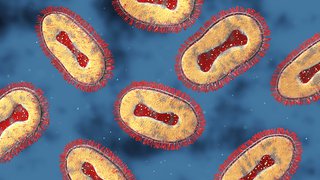COVID-19 distress: Managing your mental health in a pandemic
March 23, 2020

When the world is plunged headlong into a pandemic, the likes of which we haven’t seen in our lifetimes, it is a nerve-jangling experience for everyone.
For the 500 million people worldwide who are already struggling with depression and anxiety disorders, it can feel downright paralyzing because our brains are designed around predictability and structure, and knowing what the future entails.
The COVID-19 outbreak taps into very specific fears at the core of our survival.
- It is a novel danger and a potential threat to our lives.
- It is an invisible agent; we can’t see it, touch it, or know where it is.
- It has caused rapid and profound disruption in our lives; it’s evolving at such a dizzying pace we have difficulty processing all that is happening.
- And there is uncertainty about its full impact on our health, culture, and economy.
There are, however, some practical, common sense and clinical solutions to manage the distress associated with COVID-19. Recently, I spoke about ways we can preserve and monitor our mental health during this crisis with Krys Boyd, the host of KERA’s public radio program “Think.”
Some of the most essential portions of our interview are shared in this article. If you’d like to hear the entire conversation, it is available on KERA’s website.
Coping with COVID-19
The collective discomfort we all feel as COVID-19 spreads is to be expected. If you’re not a little nervous, you’re probably in denial and putting on a facade of invulnerability. But there are some segments of society that are more at-risk for mental health concerns:
- Older people and people with chronic conditions will understandably have heightened fear, anxiety, and feelings of isolation.
- Children and teens may have difficulty understanding and coping with this crisis and it may be expressed in behaviors rather than symptoms.
- People who are helping with the COVID-19 response, such as health care professionals and first responders, put themselves at risk every day. That can lead to intense stress, fear of catching and transmitting infection, as well as burnout as the pandemic progresses.
- People with any pre-existing mental health conditions may see their symptoms and conditions magnified. Those conditions include patients with substance use, PTSD and other trauma-related disorders, anxiety, depression, illness anxiety or somatic symptom disorder, and obsessive-compulsive disorder with fear of germs or contamination.
We’ve learned from past pandemics that the mental health impact is not only short term, but in susceptible individuals there can be lasting effects, such as increased use of alcohol and risk of developing or worsening psychiatric conditions. We also know which factors contribute to it, and what the remedies can be.
'If there is any silver lining to be found amid a pandemic it’s that we have a common enemy, and the best way to defeat it is with mutual support and a united front.'
In general, I recommend that people with pre-existing mental health conditions be extra diligent during this time:
- Adopt a healthy lifestyle, which should include exercise, nutrition, sleep, relaxing activities, and avoiding alcohol.
- Remain compliant with your treatment; in fact, increase your engagement and counseling if possible. Video and phone visits are now more readily available.
- Change medication if necessary, but always in consultation with your prescriber.
- Lean on your support system – your loved ones and friends, neighbors, and health care providers. Healthy social media use in this situation also can be very helpful.
If there is any silver lining to be found amid a pandemic it’s that we have a common enemy, and the best way to defeat it is with mutual support and a united front. That sense of altruism can have potent emotional benefits for all of us.
5 ways to keep COVID-19 in perspective
We’ve lost so many things in a short period of time – structure, routines, economic and everyday freedoms, even food choices – that trying to grasp the full impact of the pandemic can feel overwhelming. Even outlets such as sports, entertainment, and school have disappeared, for the most part. So how do we balance being consumed by COVID-19, and becoming too cavalier about its risks?

Here are some suggestions to help keep things in perspective:
- Acknowledge your fears but focus on facts: It’s OK to be scared. This is an extremely disruptive and uncertain situation. But there are certain facts we can all agree on: The actual risk of having a serious or life threatening illness from COVID-19 is relatively small compared to the risk of contributing to its spread. The drastic measures and disruption are preventive in nature.
- Maintain routines as much as possible: Keep your sleep, meal, and work schedules the same (if you are able to work from home).
- Eat a healthy diet and exercise: A holistic approach is good for your mental health and physical well-being. Exercise can be a welcome distraction from the worry cycle, and it has a positive effect on brain growth and neurotransmitters. Also, maintain good nutrition, avoid a high glycemic diet, and eat when you are hungry not just bored.
- Limit media exposure; reach out on social media: In this climate, you should definitely be aware of what is going, but staying glued to TV news or social media can be counterproductive. Instead, use social media, smart phones, and technology to reach out to friends and loved ones and stay connected while you’re stuck at home.
- Make use of the time to get things done: We all feel a loss of control, so it can be valuable to create a sense of accomplishment by completing chores you might have put off when life was busier. That can be anything from closet organization to home improvement projects. The key takeaway is to do things, rather than spend too much time thinking and mulling. Achievements, no matter how small, are empowering.
5 ways to help children and teens
Children may have difficulty processing their emotions and expressing themselves. So be on the lookout for behavioral changes such as becoming more withdrawn, less interested, or more oppositional. The primary strategy with children is to sit down with them, have a discussion, and get them the facts:

- Be honest and reassuring: It is OK to acknowledge fear and anxiety, but also be reassuring with children and provide them with basic facts about COVID-19. Also, let them know we are doing everything we can to keep them safe.
- Give them structure: Keeping children engaged and busy is vital to mitigate boredom and loneliness. Reach out to their school or teacher to see about online or remote learning. Also take this opportunity to plan some family projects, exercise, and activities together.
- Let it be a teaching moment: Talk about the importance and the various ways to decrease exposure for themselves and others. Make them feel apart of the solution.
- Explain the importance of social distancing: It’s hard to resist the urge to get together with friends when everybody is home and feeling fine. But you can tell them it is part of our jobs now to help reduce the spread of COVID-19.
- Embrace social media, with limits: It’s OK to relax some of your normal rules when it comes to digital devices and social media so children have the chance to connect with their friends. But continue to set limits, particularly on information sources.
Panic and blame won’t help: Resist them
In a study published recently in The Lancet, researchers reviewed data related to people who had been quarantined over the last 20 years of pandemics to determine what, if any, lasting psychological impact it creates. In the short term, the lack of information, access to supplies, fear of infection, boredom and loneliness, and duration of quarantine were major risk factors for increased distress.
Financial hardship and stigmatization were most associated with long-term mental health problems.
We’ve already seen businesses and industries grind to a halt and people lose their jobs, which creates an atmosphere ripe with anxiety and anger. The government may be taking some steps to provide temporary relief, but financial hardship is a significant stressor – the kind that can impact you in such a way that you might need professional help, even for a short period of time.
'We have to remember that the human brain desensitizes very quickly, which means that once the COVID-19 pandemic is over, we will be eager to go back to our usual routines. But the lessons we learn from this pandemic should not be forgotten.'
As for the stigma, pandemics throughout history have been named after a community – the Spanish flu of 1918, the Asian flu of 1957, the Hong Kong flu of 1968, are a few examples. The COVID-19 pandemic has been labeled the Wuhan virus or Chinese virus in some instances.
Once we start going in that direction, we begin to isolate individuals, start blaming them, and feed unfounded fears. It creates prejudice, xenophobia, and racial discrimination as well. As people infected with the disease become stigmatized, they are less likely to seek help. When they finally do, they usually have more advanced states of the illness.
For health care workers, the stigma can be very profound, too. Following the Ebola virus outbreak in Dallas, for instance, many of the health care workers involved in helping prevent the spread of that deadly disease were ostracized and unable to get back to work because of the stigma associated with it.
One thing we can do is go out of our way to push back against stigmatization and show compassion and support to the affected individuals and communities. We have to remember that the human brain desensitizes very quickly, which means that once the COVID-19 pandemic is over, we will be eager to go back to our usual routines.
But the lessons we learn from this pandemic should not be forgotten.










